As a cat owner, you’re probably familiar with fleas, ticks, and intestinal worms. But did you know that mosquitoes can pose a serious threat to your feline friend in the form of heartworms? While cats are thankfully more resistant to this nasty parasite than dogs, heartworm disease is still a real danger. In fact, studies show that 5-20% of cats with heartworm are affected – indoor or outdoor cats, it doesn’t matter!
- 5-20% of cats with heartworm are affected, indoor or outdoor status doesn't matter.
- Even a single heartworm can lead to severe health issues in cats, including sudden death.
- Heartworm disease in cats is caused by the parasite Dirofilaria immitis, transmitted via mosquitoes.
- No FDA-approved heartworm medication exists for cats, so prevention and symptom management are key.
The truly terrifying part? Just one single heartworm can cause severe health problems in a cat. These parasites take up residence in your fluff ball’s heart or lungs and can cause a host of miserable symptoms—respiratory issues, heart failure, and even sudden death.
The scary truth is, that even a single heartworm can cause severe health issues in a cat. These parasites take up residence in the heart and lungs, leading to respiratory problems, heart failure, and even sudden death. It’s a frightening prospect, but understanding heartworm disease is the first step in protecting your beloved pet.
Let’s dive into how heartworms infect cats, the symptoms, and what you can do about it.
The information provided herein is for informational purposes only. Please refer to our disclaimer for more details..
- What Is Heartworm Disease in Cats?
- Cycle of the Heartworm – How Heartworms Transmit To Your Cats?
- Heartworm Associated Respiratory Disease (HARD) in Cats
- Understanding the Dangers of HARD
- Symptoms of Heartworm Disease in Cats
- Diagnosing Heartworm in Cats
- Treatment for Heartworm Disease
- Heartworm Prevention: The Best Defense
- Living with a Heartworm-Positive Cat
- Final Thoughts!
What Is Heartworm Disease in Cats?
Heartworm disease is a dangerous condition affecting cats, dogs, and ferrets. It’s caused by a parasitic worm called Dirofilaria immitis. These nasty worms can be up to a foot long and take up residence in an animal’s heart, lungs, and blood vessels. Luckily, cats are more resistant to heartworm than dogs, but that doesn’t mean they’re immune.
Cycle of the Heartworm – How Heartworms Transmit To Your Cats?
Unlike with dogs, getting heartworms as a cat takes a somewhat convoluted path. It’s not something a cat just catches from another cat – mosquitoes are the culprits here! Here’s how it happens:
- The Mosquito’s Role: A mosquito carrying heartworm larvae (called microfilariae) needs to bite your cat. These larvae usually come from an infected dog, but they can come from infected cats, too. The microfilariae spend the next 10-14 days maturing inside the mosquito.
- Into the Cat: Once those larvae are developed, they’re ready to infect another animal. That’s where your cat comes in. If that same mosquito bites them, the larvae are deposited.
- Migration and Development: These larvae aren’t done traveling yet! They burrow through your cat’s tissues and eventually reach the bloodstream. Their final destination is the right side of the heart and pulmonary arteries. This is where they’ll grow into adult heartworms over the next 7-8 months.
- Challenges for the Heartworms: Cats aren’t the ideal home for heartworms. Because of that, many of the immature worms won’t make it this far. Additionally, adult heartworms in cats only live for about 2-4 years, compared to much longer lifespans in dogs.
Note: It’s important to remember that heartworm infection in cats always involves a mosquito bite. There’s no direct transmission from cat to cat, or even dog to cat. Also, the chance of a cat becoming infected increases when mosquitoes are most active, which means temperatures above 50°F (10°C) are necessary.
Heartworm Associated Respiratory Disease (HARD) in Cats
Cats also usually have a smaller number of adult heartworms – typically only one to three. And if that weren’t enough, fewer of these adult worms actually produce the next stage of larvae (microfilaria). This makes the spread of heartworm less common in cats.
Sometimes, the heartworms get a bit lost and wander into other parts of the body – blood vessels, organs, or even the central nervous system! This is called aberrant heartworm migration.
Don’t be fooled by the low number of worms cats may typically have. Even immature heartworms can really mess with your kitty’s lungs, causing Heartworm Associated Respiratory Disease (HARD). HARD is a serious condition that can include:
- Breathing Difficulty
- Coughing (which may be severe)
- Allergic reactions
- inflammation in Lungs
- In the worst cases, heart failure
HARD symptoms can resemble asthma or other respiratory problems, making it tricky to diagnose. Sometimes, cats with HARD don’t even have any adult heartworms! This happens because the immature worms die within the lungs, causing all that inflammation and damage without ever maturing into adults.
Understanding the Dangers of HARD
The main issue with HARD stems from the inflammation caused by dying immature heartworms in the delicate blood vessels, tiny airways, and lung tissues leading to lung disease. This inflammation can have long-lasting consequences. Additionally, adult heartworms die in the heart and the pulmonary arteries (the blood vessels leading from the heart to the lungs). Over time, chronic inflammation leads to scarring, narrowing in the arteries, and thickening of the nearby lung tissues.
These irreversible changes ramp up blood pressure in the lungs (pulmonary hypertension), forcing the heart to pump way harder to get blood oxygenated. Sadly, adult heartworms have an even more severe impact on cats than dogs because our feline companions have much smaller blood vessels. Even a single adult heartworm can be tragically fatal.
Remember!
While adult heartworms cause significant issues in cats, it’s crucial to realize the danger HARD poses. The inflammation and damage caused by those immature worms can be incredibly harmful. It’s why I always urge cat owners to prioritize heartworm prevention – those preventative medications are lifesavers!
Symptoms of Heartworm Disease in Cats
Heartworm disease is a serious, potentially fatal condition, and sadly, cats often hide the signs well. It’s essential for all cat owners to understand potential symptoms – early detection could mean the difference between life and death for your feline friend. Here’s what to watch for:
Subtle Signs of Heartworm Disease:
- Persistent cough that could sound like asthma
- General lethargy or lack of energy
- Decrease in appetite
- Unexplained weight loss
More Pronounced Signs:
- Difficulty in breathing or rapid breathing
- Open-mouthed breathing (a sign of respiratory distress)
- Vomiting (which may occasionally include blood)
- Intermittent gagging
- Exercise intolerance (your cat may tire easily)
Severe or Acute Signs:
- Heart murmur (an abnormal heart sound)
- Fluid buildup in the abdomen
- Neurological problems (like trouble walking, seizures, or fainting)
- Sudden collapse
- Sadly, in some cases, sudden death
Important Notes:
- These signs can easily be mistaken for other illnesses, like feline asthma or bronchitis. That’s why it’s always best to consult your veterinarian if you notice any concerning changes in your cat’s health.
- Even if your cat shows no outward symptoms, that doesn’t mean they are clear of heartworm. These parasites are insidious, and damage can occur before the signs become obvious.
Diagnosing Heartworm in Cats
Heartworm disease is a serious condition, and even subtle symptoms can point to something big. While you might be tempted to try figuring out what’s wrong with your feline friend based on some internet research, trust me, that’s a recipe for trouble. Heartworms are tricky – they’re masters of disguise within your cat’s body, and misdiagnosis could lead to delayed treatment or worse.
Why a vet’s expertise is absolutely necessary?
Feline heartworm symptoms often mimic other illnesses like asthma or allergies. That cough? Sure, it could be heartworm, but it could also be a host of other things.
It’s not a one-and-done process. Vets use a combination of blood tests, X-rays, ultrasounds, and their knowledge of your cat’s history to paint a full picture. There’s no single test that’s foolproof.
Observation
It Starts with Observation, your vet will do a thorough physical exam and ask about your cat’s overall health history. Are they coughing, lethargic, or losing weight? These are all important clues.
Several key blood tests are the go-to here
- Antibody Test: A positive result means exposure to heartworms, kicking off further testing. However, it can’t tell the whole story on its own.
- Antigen Test: This one hunts for adult female heartworms. Super specific, but a negative test doesn’t rule out heartworm entirely. Cats with a smaller number of worms or only male worms will often test negative.
- Microfilariae Test: While pretty rare to find baby heartworms (microfilariae) in cats, this test checks for it. Positive means heartworms for sure, but a negative result doesn’t mean your cat’s in the clear.
- Other Clues: Bloodwork can reveal other things like raised eosinophil levels (a type of white blood cell). While not a diagnosis on its own, it supports suspicion of a parasite like heartworm.
X-Rays & Ultrasounds Add Visual Proof
- X-rays: These can show changes in your cat’s lungs and heart, such as enlarged blood vessels. However, it’s not foolproof – especially in early infections.
- Ultrasound: Sometimes, vets can actually visualize those adult worms wiggling around. This is the smoking gun but can be missed if only a few worms are present.
- PCR: Researchers are even exploring PCR tests to detect heartworm-related bacteria, offering another potential diagnostic weapon.
It’s your vet who pieces all these puzzle pieces together, and their expertise makes all the difference in ensuring your fluffy friend gets the best possible care.
Treatment for Heartworm Disease
Treating heartworms in cats is a complex challenge, and it breaks my heart as a veterinarian to tell you there isn’t a magic solution. Unlike our canine patients,no FDA-approved medication exists that’s completely safe and effective for our feline friends. Because of this, treatment largely focuses on managing symptoms and supporting your cat’s body as it fights the infection.
Drug Therapy
While there’s no magic cure, veterinarians may use a few medications to help manage the disease and slow its progression and there is a chance of 25%-50% survival of infected cats :
- Slow-kill method: Sometimes, vets may use ivermectin (monthly) heartworm preventive, to gradually reduce the worm burden over a long period (almost 2 years). But beware, even this approach carries the risk of severe reactions when dying worms cause inflammation.
- Steroids: Prednisolone is often prescribed to tackle the severe inflammation caused by heartworms. It’s a lifesaver when your cat experiences breathing trouble.
- Antibiotics:Doxycycline is also used to treat heartworm disease, as it targets a bacterium called Wolbachia that lives within the heartworms – killing it may help decrease the inflammatory response caused by heartworms.
- Bronchodilators: For respiratory distress, drugs like terbutaline, theophylline, or albuterol can help open up those airways and make breathing a bit easier.
Surgical Removal: A High-Risk Option
It’s possible to surgically remove heartworms from a cat, but this carries huge risks. It’s a specialized procedure reserved for the most severe cases, and even then, the chance of complications is significant. Think of it as a last resort – a long shot when other options fail. The procedure needs a highly skilled surgeon (often found at veterinary universities) because there’s a high chance of about 40% severe reactions or even death as the worms are removed.
Important Note: If your cat is showing ANY signs of respiratory distress (like open-mouth breathing), get them to an emergency vet immediately. Oxygen, IV fluids, steroids, and other critical measures can make the difference between life and death.
Heartworm Prevention: The Best Defense
Heartworm prevention isn’t just for dogs anymore. Today, keeping your feline friends on a preventative is just as critical. While they might not get heartworm as frequently as dogs, there’s too much at stake to ignore the risk.
Year-round Heartworm Preventive Medications
Thankfully, keeping your cat safe is easier than ever. Your veterinarian can recommend the best heartworm preventative for your cat. There are a variety of options available, like Revolution®, Interceptor®, NexGard® Combo, Centragard® and Heartgard®. These work wonders at preventing those nasty heartworms from ever taking hold.
Why Year-Round Prevention Matters?
Many cat owners might think heartworm prevention is only necessary in warmer months when mosquitoes are more active. But here’s the thing: mosquitoes can be sneaky, and even a mild winter doesn’t guarantee they’re gone completely. That’s why following the American Heartworm Society, advice to think 12 is perfectly wise:
Testing: Schedule a 12-month heartworm test for your cat. This will help ensure early detection if your cat does come into contact with heartworm larvae.
Prevention: Provide your cat with 12 months of heartworm medication.
Reducing Mosquito Exposure
Mosquitoes are the annoying culprits that spread heartworm. While indoor cats are at a lower risk, it doesn’t hurt to take extra precautions. Here are some tips to keep mosquitos out of your house:
- Keep screens in good repair: It only takes a tiny opening for those pests to find their way indoors.
- Minimize standing water: Mosquitos breed where there’s stagnant water. Check flowerpots, bird baths, and even old tires for potential breeding grounds.
- Cat-safe mosquito repellent: There are a few products available, so talk to your vet about the safest ones for your cat.
Living with a Heartworm-Positive Cat
If your cat does test positive for heartworm, don’t despair. While, sadly, there’s no perfect treatment for felines, there are ways to manage the situation:
Ongoing Monitoring and Care
Your vet will become your best ally they’ll work with you to develop a plan to keep your cat comfortable and monitor their condition. Frequent check-ups and possibly medication are very important.
Prognosis and Long-Term Effects
Cats with heartworm can have varied outcomes, some cats do well for a long time, while others have complications quickly. Even after the heartworms are gone – your cat may still have lingering respiratory problems.
Final Thoughts!
Heartworm disease is a dangerous and potentially life-threatening condition that can affect even the most well-cared-for cats. While cats are more resistant to heartworm than dogs, those long, nasty worms can still wreak havoc on your feline friend’s heart and lungs. Even with a smaller worm burden, the inflammation caused by immature worms can have devastating consequences.
Remember, heartworm symptoms in cats are often tricky to spot, and misdiagnosis is a real concern. Don’t take any chances – if your cat is showing signs of lethargy, coughing, breathing difficulties, or any other concerning changes, get them to a trusted veterinarian immediately.
Have you ever had a cat with heartworm disease? Share your experiences in the comments below. Let’s spread the word about keeping our kitties safe.
408views
Share on Facebook
 Dark Mode
Dark Mode 

 No fees, cancel anytime
No fees, cancel anytime 


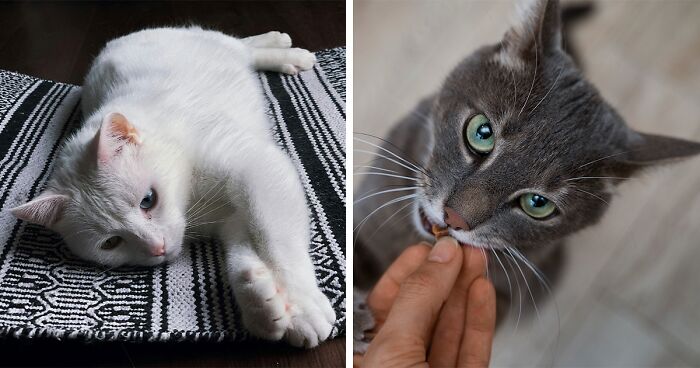
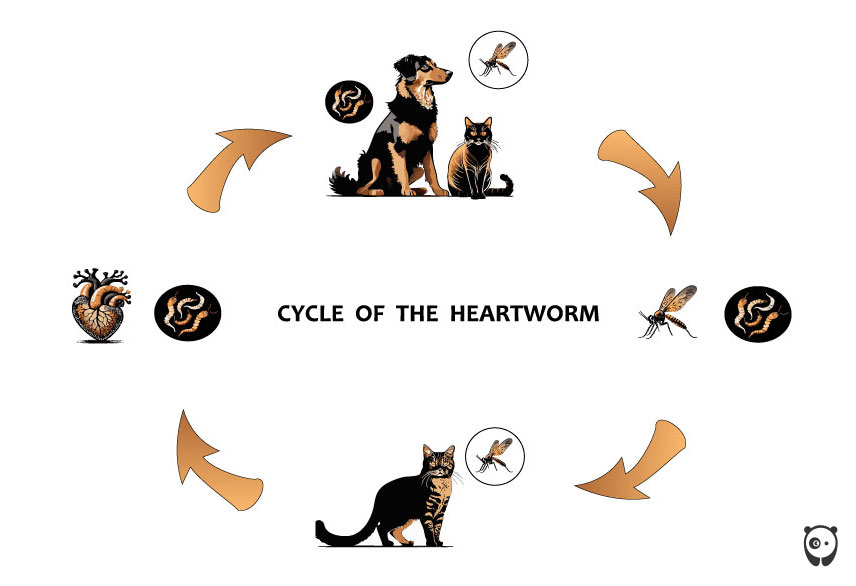
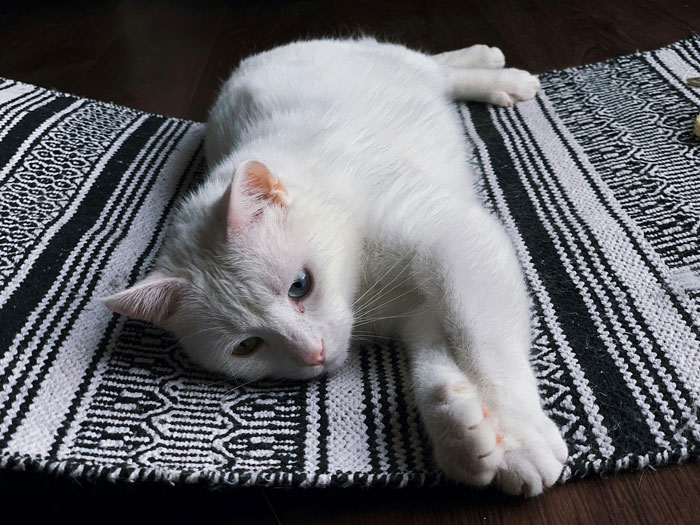 Image credits:
Image credits: 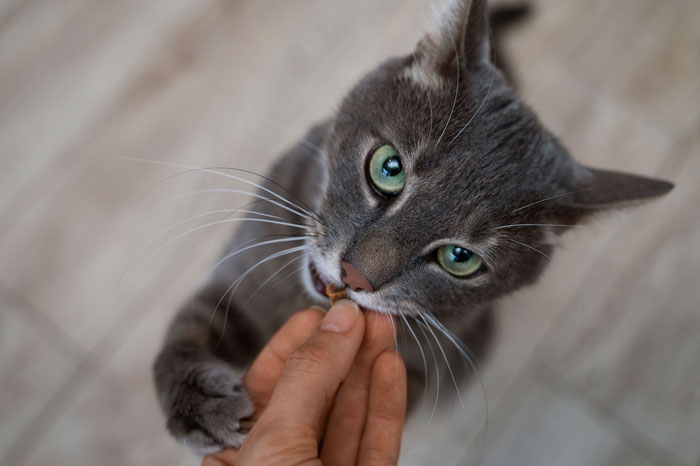 Image credits:
Image credits: 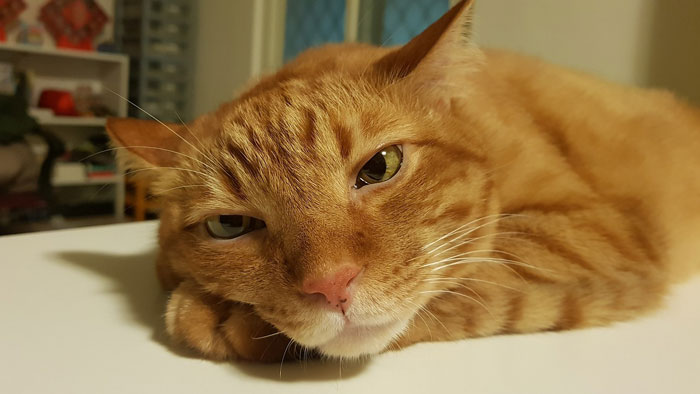 Image credits:
Image credits: 










































7
0